Challenges and Business Decisions in Start-Up Enterprises Report
VerifiedAdded on 2023/06/04
|13
|2724
|182
Report
AI Summary
This report delves into the multifaceted challenges and critical decisions inherent in establishing and developing a start-up enterprise. It examines the hurdles entrepreneurs face, including securing funding, developing business plans, and assembling effective teams. The report explores strategic and financial decision-making processes, including the selection of business structures, human resource management, and operational strategies. Furthermore, it analyzes the role of government in supporting start-ups through grants and financial assistance, emphasizing the importance of job creation, economic efficiency, and the need for minimal capital investment. The report underscores the significance of a supportive environment for new ventures to drive economic growth and innovation.
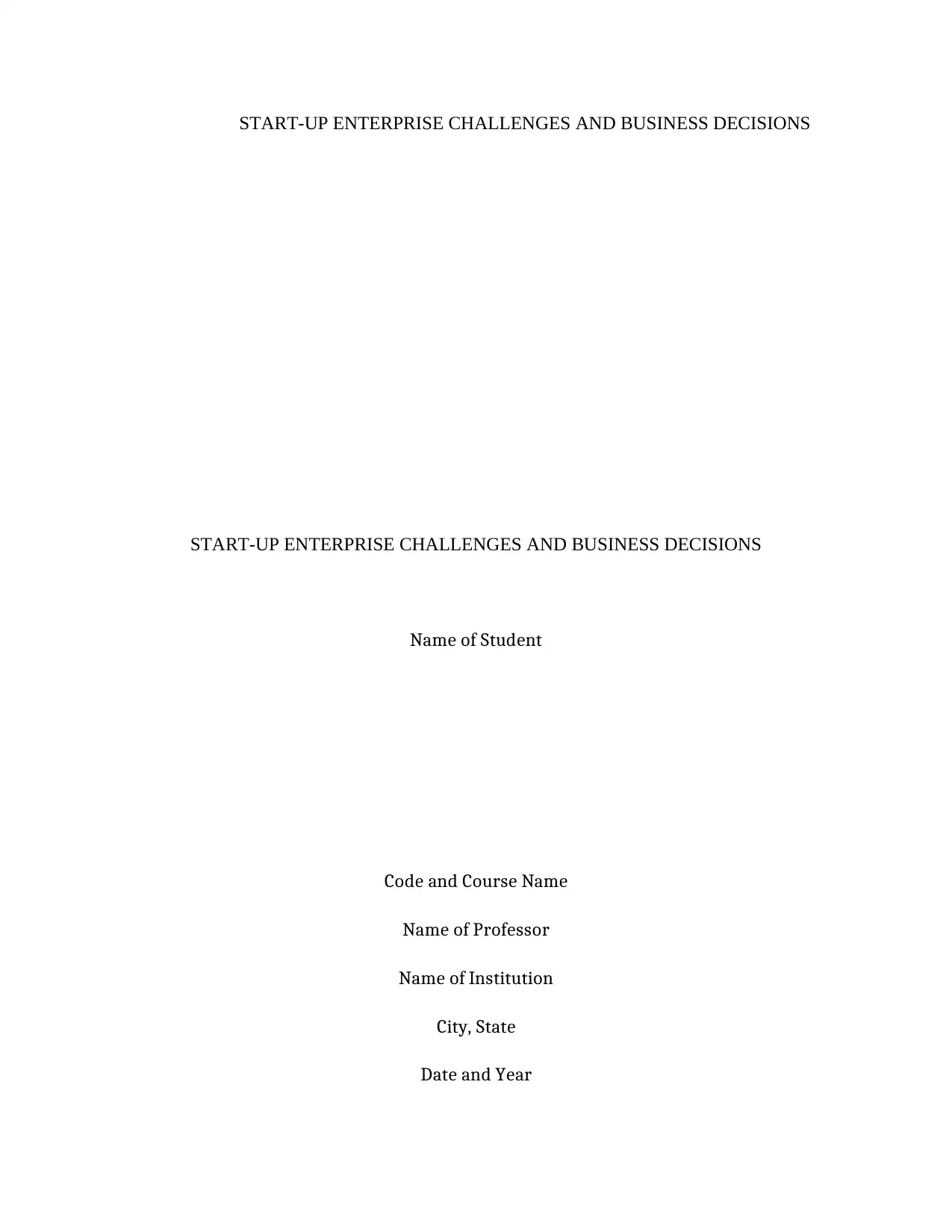
START-UP ENTERPRISE CHALLENGES AND BUSINESS DECISIONS
START-UP ENTERPRISE CHALLENGES AND BUSINESS DECISIONS
Name of Student
Code and Course Name
Name of Professor
Name of Institution
City, State
Date and Year
START-UP ENTERPRISE CHALLENGES AND BUSINESS DECISIONS
Name of Student
Code and Course Name
Name of Professor
Name of Institution
City, State
Date and Year
Paraphrase This Document
Need a fresh take? Get an instant paraphrase of this document with our AI Paraphraser
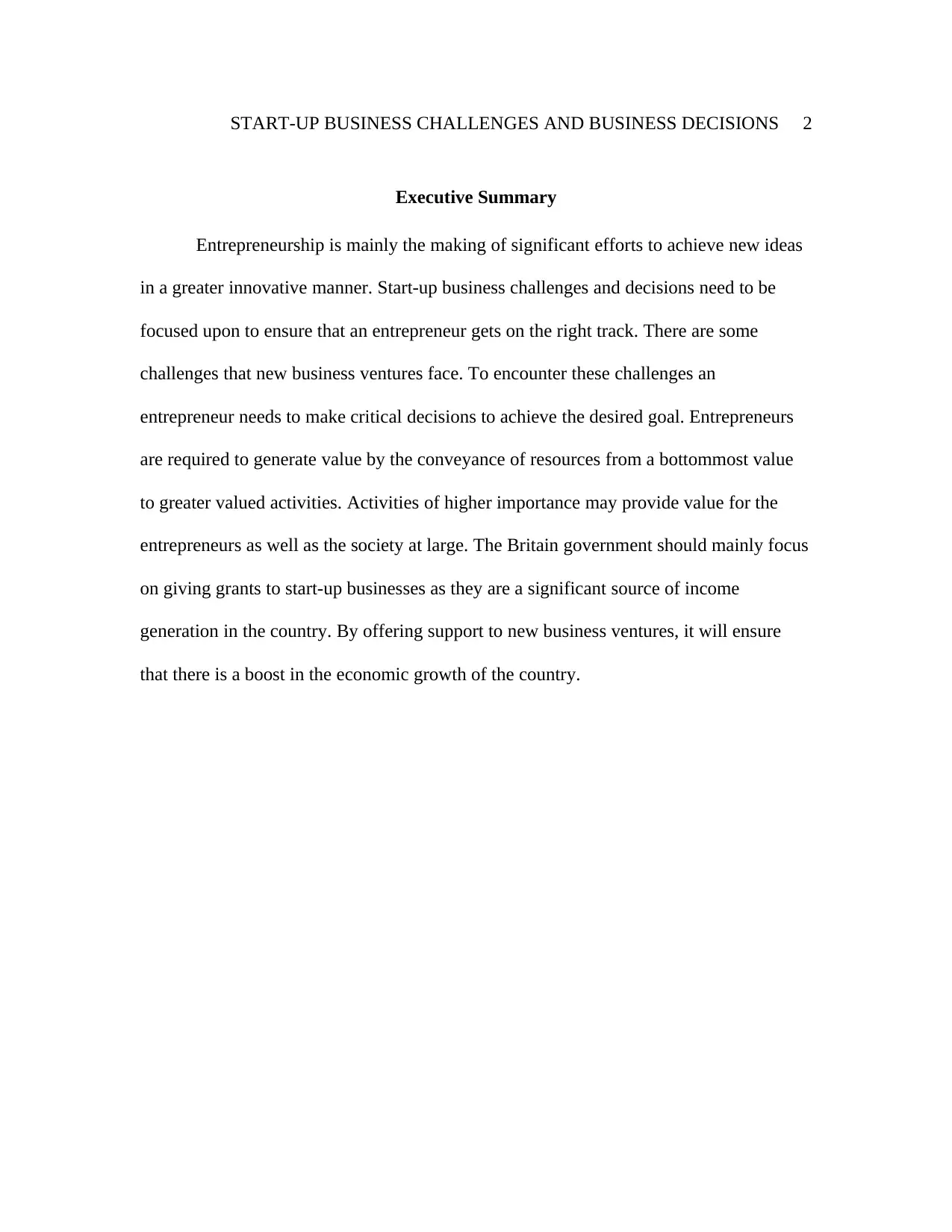
START-UP BUSINESS CHALLENGES AND BUSINESS DECISIONS 2
Executive Summary
Entrepreneurship is mainly the making of significant efforts to achieve new ideas
in a greater innovative manner. Start-up business challenges and decisions need to be
focused upon to ensure that an entrepreneur gets on the right track. There are some
challenges that new business ventures face. To encounter these challenges an
entrepreneur needs to make critical decisions to achieve the desired goal. Entrepreneurs
are required to generate value by the conveyance of resources from a bottommost value
to greater valued activities. Activities of higher importance may provide value for the
entrepreneurs as well as the society at large. The Britain government should mainly focus
on giving grants to start-up businesses as they are a significant source of income
generation in the country. By offering support to new business ventures, it will ensure
that there is a boost in the economic growth of the country.
Executive Summary
Entrepreneurship is mainly the making of significant efforts to achieve new ideas
in a greater innovative manner. Start-up business challenges and decisions need to be
focused upon to ensure that an entrepreneur gets on the right track. There are some
challenges that new business ventures face. To encounter these challenges an
entrepreneur needs to make critical decisions to achieve the desired goal. Entrepreneurs
are required to generate value by the conveyance of resources from a bottommost value
to greater valued activities. Activities of higher importance may provide value for the
entrepreneurs as well as the society at large. The Britain government should mainly focus
on giving grants to start-up businesses as they are a significant source of income
generation in the country. By offering support to new business ventures, it will ensure
that there is a boost in the economic growth of the country.
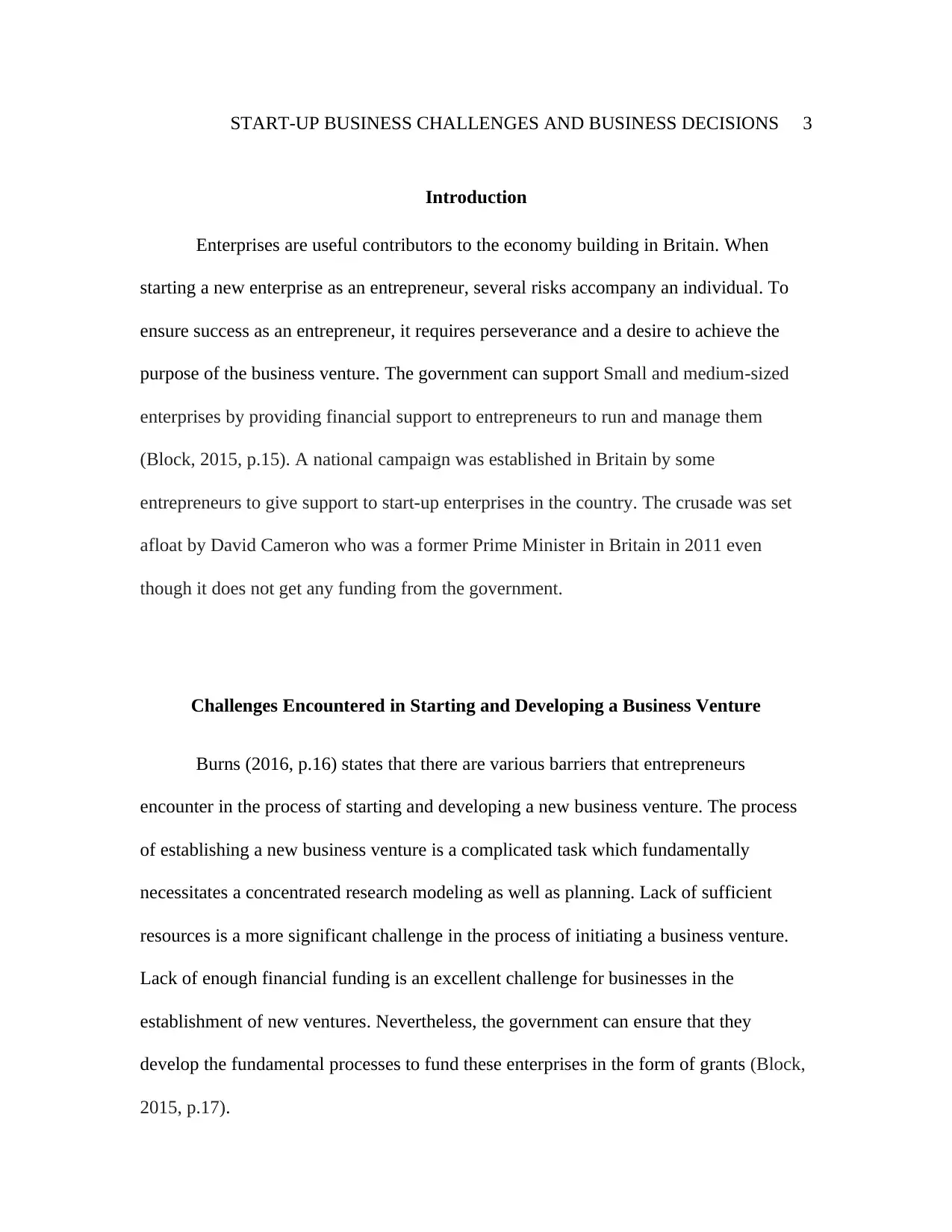
START-UP BUSINESS CHALLENGES AND BUSINESS DECISIONS 3
Introduction
Enterprises are useful contributors to the economy building in Britain. When
starting a new enterprise as an entrepreneur, several risks accompany an individual. To
ensure success as an entrepreneur, it requires perseverance and a desire to achieve the
purpose of the business venture. The government can support Small and medium-sized
enterprises by providing financial support to entrepreneurs to run and manage them
(Block, 2015, p.15). A national campaign was established in Britain by some
entrepreneurs to give support to start-up enterprises in the country. The crusade was set
afloat by David Cameron who was a former Prime Minister in Britain in 2011 even
though it does not get any funding from the government.
Challenges Encountered in Starting and Developing a Business Venture
Burns (2016, p.16) states that there are various barriers that entrepreneurs
encounter in the process of starting and developing a new business venture. The process
of establishing a new business venture is a complicated task which fundamentally
necessitates a concentrated research modeling as well as planning. Lack of sufficient
resources is a more significant challenge in the process of initiating a business venture.
Lack of enough financial funding is an excellent challenge for businesses in the
establishment of new ventures. Nevertheless, the government can ensure that they
develop the fundamental processes to fund these enterprises in the form of grants (Block,
2015, p.17).
Introduction
Enterprises are useful contributors to the economy building in Britain. When
starting a new enterprise as an entrepreneur, several risks accompany an individual. To
ensure success as an entrepreneur, it requires perseverance and a desire to achieve the
purpose of the business venture. The government can support Small and medium-sized
enterprises by providing financial support to entrepreneurs to run and manage them
(Block, 2015, p.15). A national campaign was established in Britain by some
entrepreneurs to give support to start-up enterprises in the country. The crusade was set
afloat by David Cameron who was a former Prime Minister in Britain in 2011 even
though it does not get any funding from the government.
Challenges Encountered in Starting and Developing a Business Venture
Burns (2016, p.16) states that there are various barriers that entrepreneurs
encounter in the process of starting and developing a new business venture. The process
of establishing a new business venture is a complicated task which fundamentally
necessitates a concentrated research modeling as well as planning. Lack of sufficient
resources is a more significant challenge in the process of initiating a business venture.
Lack of enough financial funding is an excellent challenge for businesses in the
establishment of new ventures. Nevertheless, the government can ensure that they
develop the fundamental processes to fund these enterprises in the form of grants (Block,
2015, p.17).
⊘ This is a preview!⊘
Do you want full access?
Subscribe today to unlock all pages.

Trusted by 1+ million students worldwide
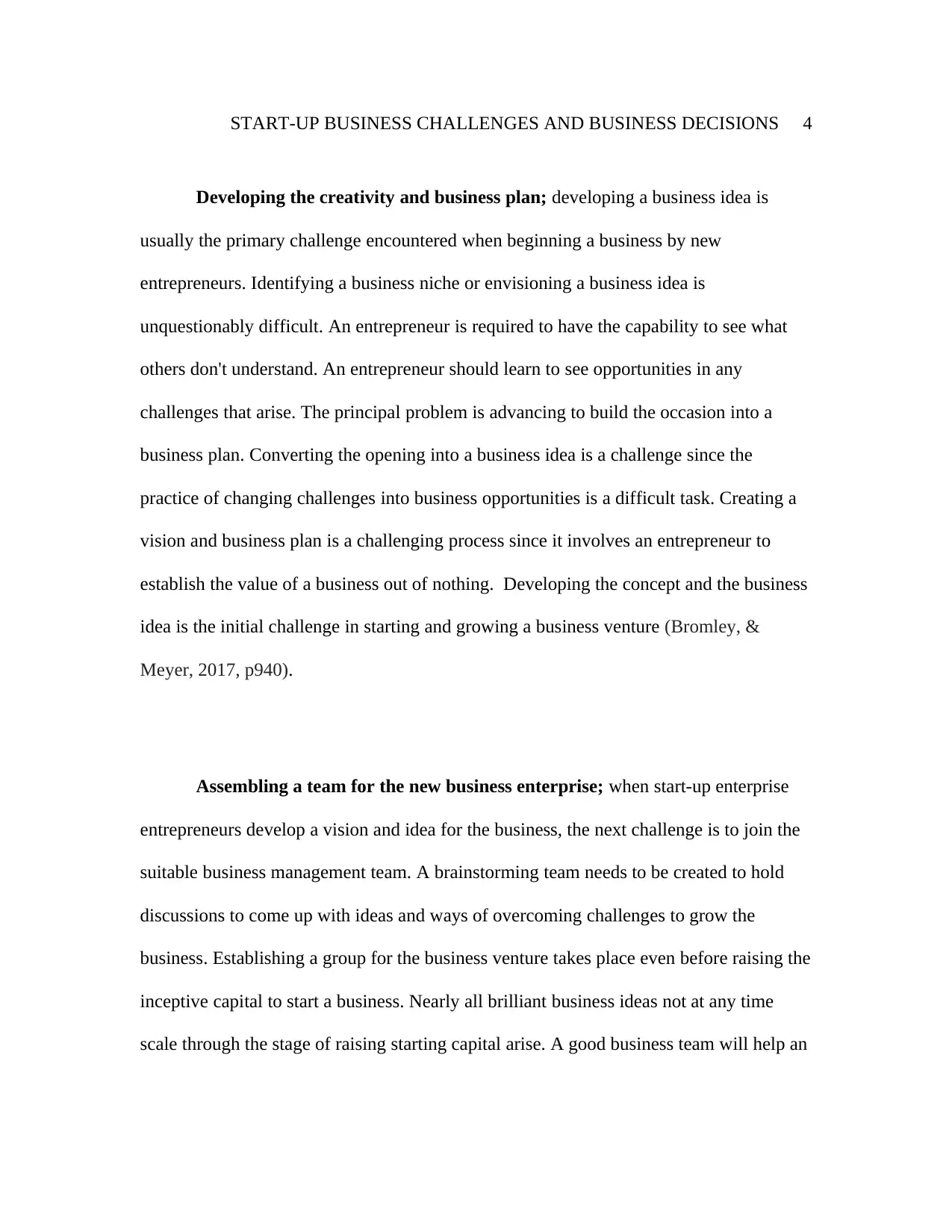
START-UP BUSINESS CHALLENGES AND BUSINESS DECISIONS 4
Developing the creativity and business plan; developing a business idea is
usually the primary challenge encountered when beginning a business by new
entrepreneurs. Identifying a business niche or envisioning a business idea is
unquestionably difficult. An entrepreneur is required to have the capability to see what
others don't understand. An entrepreneur should learn to see opportunities in any
challenges that arise. The principal problem is advancing to build the occasion into a
business plan. Converting the opening into a business idea is a challenge since the
practice of changing challenges into business opportunities is a difficult task. Creating a
vision and business plan is a challenging process since it involves an entrepreneur to
establish the value of a business out of nothing. Developing the concept and the business
idea is the initial challenge in starting and growing a business venture (Bromley, &
Meyer, 2017, p940).
Assembling a team for the new business enterprise; when start-up enterprise
entrepreneurs develop a vision and idea for the business, the next challenge is to join the
suitable business management team. A brainstorming team needs to be created to hold
discussions to come up with ideas and ways of overcoming challenges to grow the
business. Establishing a group for the business venture takes place even before raising the
inceptive capital to start a business. Nearly all brilliant business ideas not at any time
scale through the stage of raising starting capital arise. A good business team will help an
Developing the creativity and business plan; developing a business idea is
usually the primary challenge encountered when beginning a business by new
entrepreneurs. Identifying a business niche or envisioning a business idea is
unquestionably difficult. An entrepreneur is required to have the capability to see what
others don't understand. An entrepreneur should learn to see opportunities in any
challenges that arise. The principal problem is advancing to build the occasion into a
business plan. Converting the opening into a business idea is a challenge since the
practice of changing challenges into business opportunities is a difficult task. Creating a
vision and business plan is a challenging process since it involves an entrepreneur to
establish the value of a business out of nothing. Developing the concept and the business
idea is the initial challenge in starting and growing a business venture (Bromley, &
Meyer, 2017, p940).
Assembling a team for the new business enterprise; when start-up enterprise
entrepreneurs develop a vision and idea for the business, the next challenge is to join the
suitable business management team. A brainstorming team needs to be created to hold
discussions to come up with ideas and ways of overcoming challenges to grow the
business. Establishing a group for the business venture takes place even before raising the
inceptive capital to start a business. Nearly all brilliant business ideas not at any time
scale through the stage of raising starting capital arise. A good business team will help an
Paraphrase This Document
Need a fresh take? Get an instant paraphrase of this document with our AI Paraphraser
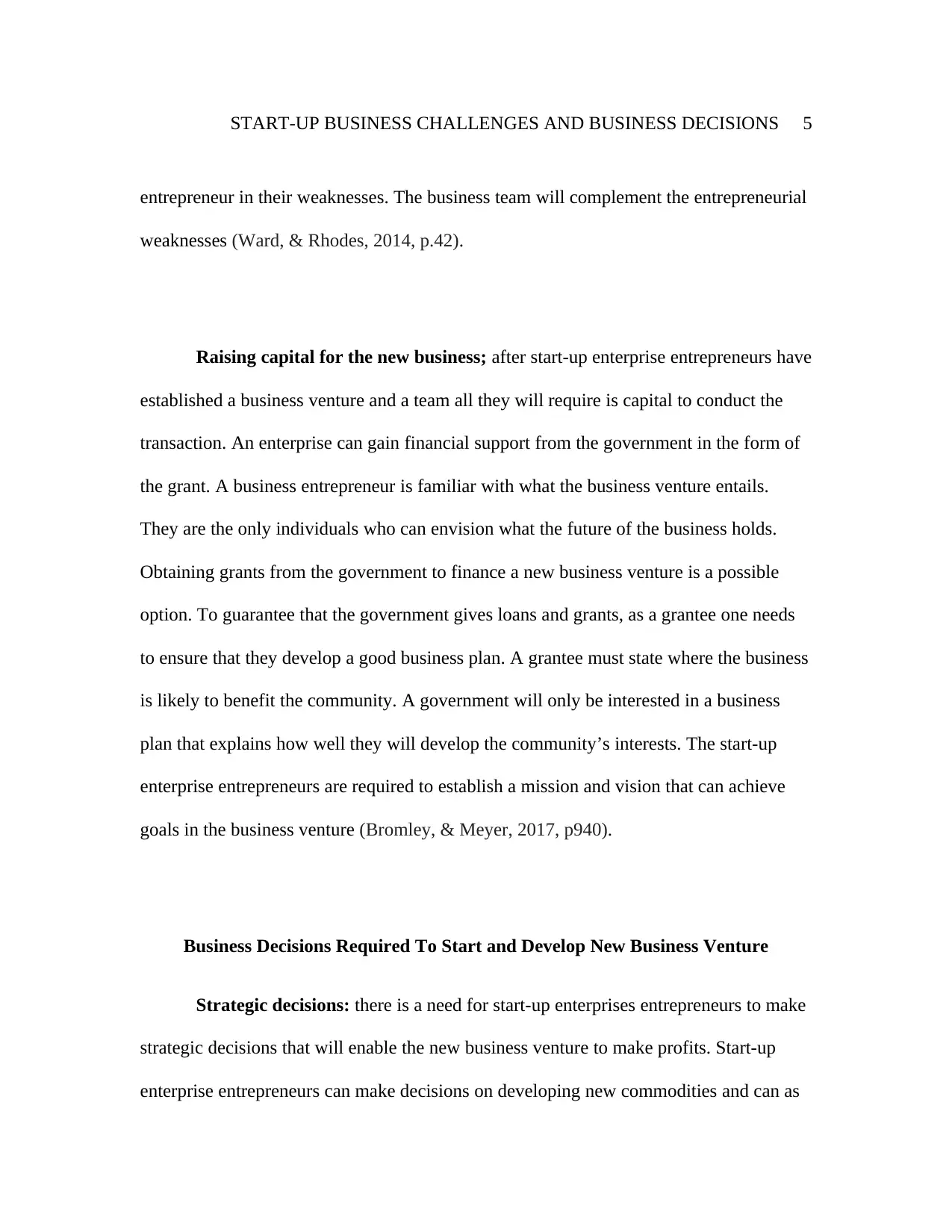
START-UP BUSINESS CHALLENGES AND BUSINESS DECISIONS 5
entrepreneur in their weaknesses. The business team will complement the entrepreneurial
weaknesses (Ward, & Rhodes, 2014, p.42).
Raising capital for the new business; after start-up enterprise entrepreneurs have
established a business venture and a team all they will require is capital to conduct the
transaction. An enterprise can gain financial support from the government in the form of
the grant. A business entrepreneur is familiar with what the business venture entails.
They are the only individuals who can envision what the future of the business holds.
Obtaining grants from the government to finance a new business venture is a possible
option. To guarantee that the government gives loans and grants, as a grantee one needs
to ensure that they develop a good business plan. A grantee must state where the business
is likely to benefit the community. A government will only be interested in a business
plan that explains how well they will develop the community’s interests. The start-up
enterprise entrepreneurs are required to establish a mission and vision that can achieve
goals in the business venture (Bromley, & Meyer, 2017, p940).
Business Decisions Required To Start and Develop New Business Venture
Strategic decisions: there is a need for start-up enterprises entrepreneurs to make
strategic decisions that will enable the new business venture to make profits. Start-up
enterprise entrepreneurs can make decisions on developing new commodities and can as
entrepreneur in their weaknesses. The business team will complement the entrepreneurial
weaknesses (Ward, & Rhodes, 2014, p.42).
Raising capital for the new business; after start-up enterprise entrepreneurs have
established a business venture and a team all they will require is capital to conduct the
transaction. An enterprise can gain financial support from the government in the form of
the grant. A business entrepreneur is familiar with what the business venture entails.
They are the only individuals who can envision what the future of the business holds.
Obtaining grants from the government to finance a new business venture is a possible
option. To guarantee that the government gives loans and grants, as a grantee one needs
to ensure that they develop a good business plan. A grantee must state where the business
is likely to benefit the community. A government will only be interested in a business
plan that explains how well they will develop the community’s interests. The start-up
enterprise entrepreneurs are required to establish a mission and vision that can achieve
goals in the business venture (Bromley, & Meyer, 2017, p940).
Business Decisions Required To Start and Develop New Business Venture
Strategic decisions: there is a need for start-up enterprises entrepreneurs to make
strategic decisions that will enable the new business venture to make profits. Start-up
enterprise entrepreneurs can make decisions on developing new commodities and can as
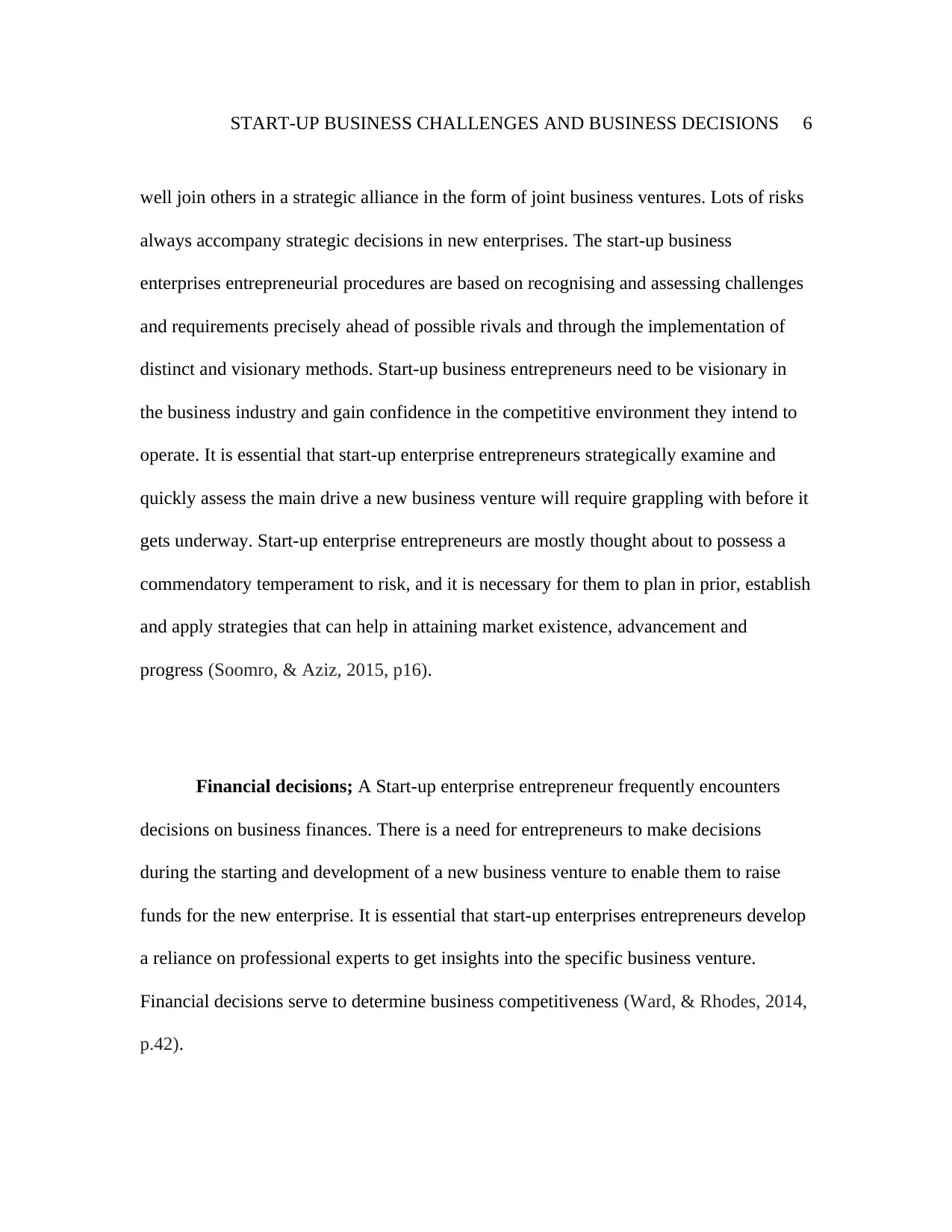
START-UP BUSINESS CHALLENGES AND BUSINESS DECISIONS 6
well join others in a strategic alliance in the form of joint business ventures. Lots of risks
always accompany strategic decisions in new enterprises. The start-up business
enterprises entrepreneurial procedures are based on recognising and assessing challenges
and requirements precisely ahead of possible rivals and through the implementation of
distinct and visionary methods. Start-up business entrepreneurs need to be visionary in
the business industry and gain confidence in the competitive environment they intend to
operate. It is essential that start-up enterprise entrepreneurs strategically examine and
quickly assess the main drive a new business venture will require grappling with before it
gets underway. Start-up enterprise entrepreneurs are mostly thought about to possess a
commendatory temperament to risk, and it is necessary for them to plan in prior, establish
and apply strategies that can help in attaining market existence, advancement and
progress (Soomro, & Aziz, 2015, p16).
Financial decisions; A Start-up enterprise entrepreneur frequently encounters
decisions on business finances. There is a need for entrepreneurs to make decisions
during the starting and development of a new business venture to enable them to raise
funds for the new enterprise. It is essential that start-up enterprises entrepreneurs develop
a reliance on professional experts to get insights into the specific business venture.
Financial decisions serve to determine business competitiveness (Ward, & Rhodes, 2014,
p.42).
well join others in a strategic alliance in the form of joint business ventures. Lots of risks
always accompany strategic decisions in new enterprises. The start-up business
enterprises entrepreneurial procedures are based on recognising and assessing challenges
and requirements precisely ahead of possible rivals and through the implementation of
distinct and visionary methods. Start-up business entrepreneurs need to be visionary in
the business industry and gain confidence in the competitive environment they intend to
operate. It is essential that start-up enterprise entrepreneurs strategically examine and
quickly assess the main drive a new business venture will require grappling with before it
gets underway. Start-up enterprise entrepreneurs are mostly thought about to possess a
commendatory temperament to risk, and it is necessary for them to plan in prior, establish
and apply strategies that can help in attaining market existence, advancement and
progress (Soomro, & Aziz, 2015, p16).
Financial decisions; A Start-up enterprise entrepreneur frequently encounters
decisions on business finances. There is a need for entrepreneurs to make decisions
during the starting and development of a new business venture to enable them to raise
funds for the new enterprise. It is essential that start-up enterprises entrepreneurs develop
a reliance on professional experts to get insights into the specific business venture.
Financial decisions serve to determine business competitiveness (Ward, & Rhodes, 2014,
p.42).
⊘ This is a preview!⊘
Do you want full access?
Subscribe today to unlock all pages.

Trusted by 1+ million students worldwide
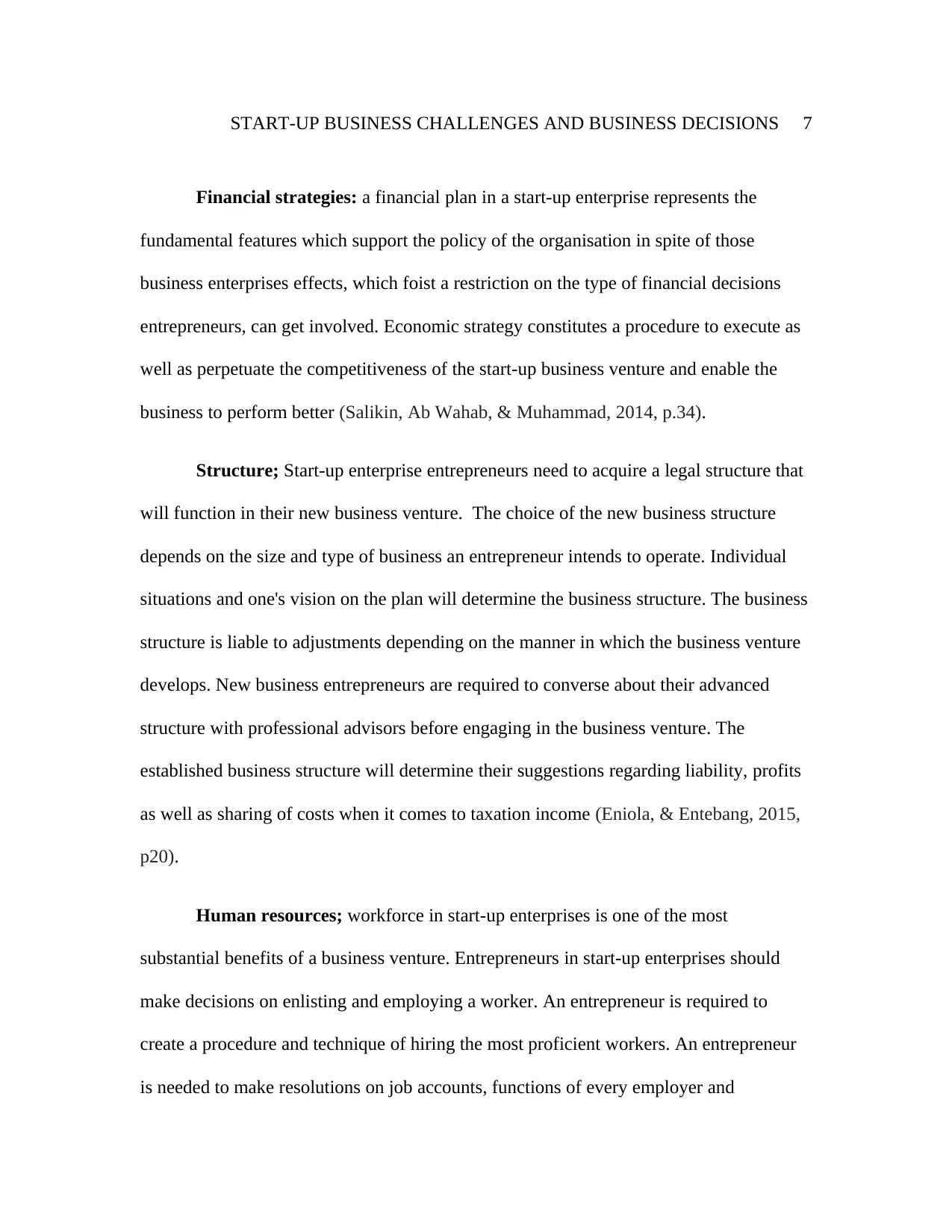
START-UP BUSINESS CHALLENGES AND BUSINESS DECISIONS 7
Financial strategies: a financial plan in a start-up enterprise represents the
fundamental features which support the policy of the organisation in spite of those
business enterprises effects, which foist a restriction on the type of financial decisions
entrepreneurs, can get involved. Economic strategy constitutes a procedure to execute as
well as perpetuate the competitiveness of the start-up business venture and enable the
business to perform better (Salikin, Ab Wahab, & Muhammad, 2014, p.34).
Structure; Start-up enterprise entrepreneurs need to acquire a legal structure that
will function in their new business venture. The choice of the new business structure
depends on the size and type of business an entrepreneur intends to operate. Individual
situations and one's vision on the plan will determine the business structure. The business
structure is liable to adjustments depending on the manner in which the business venture
develops. New business entrepreneurs are required to converse about their advanced
structure with professional advisors before engaging in the business venture. The
established business structure will determine their suggestions regarding liability, profits
as well as sharing of costs when it comes to taxation income (Eniola, & Entebang, 2015,
p20).
Human resources; workforce in start-up enterprises is one of the most
substantial benefits of a business venture. Entrepreneurs in start-up enterprises should
make decisions on enlisting and employing a worker. An entrepreneur is required to
create a procedure and technique of hiring the most proficient workers. An entrepreneur
is needed to make resolutions on job accounts, functions of every employer and
Financial strategies: a financial plan in a start-up enterprise represents the
fundamental features which support the policy of the organisation in spite of those
business enterprises effects, which foist a restriction on the type of financial decisions
entrepreneurs, can get involved. Economic strategy constitutes a procedure to execute as
well as perpetuate the competitiveness of the start-up business venture and enable the
business to perform better (Salikin, Ab Wahab, & Muhammad, 2014, p.34).
Structure; Start-up enterprise entrepreneurs need to acquire a legal structure that
will function in their new business venture. The choice of the new business structure
depends on the size and type of business an entrepreneur intends to operate. Individual
situations and one's vision on the plan will determine the business structure. The business
structure is liable to adjustments depending on the manner in which the business venture
develops. New business entrepreneurs are required to converse about their advanced
structure with professional advisors before engaging in the business venture. The
established business structure will determine their suggestions regarding liability, profits
as well as sharing of costs when it comes to taxation income (Eniola, & Entebang, 2015,
p20).
Human resources; workforce in start-up enterprises is one of the most
substantial benefits of a business venture. Entrepreneurs in start-up enterprises should
make decisions on enlisting and employing a worker. An entrepreneur is required to
create a procedure and technique of hiring the most proficient workers. An entrepreneur
is needed to make resolutions on job accounts, functions of every employer and
Paraphrase This Document
Need a fresh take? Get an instant paraphrase of this document with our AI Paraphraser
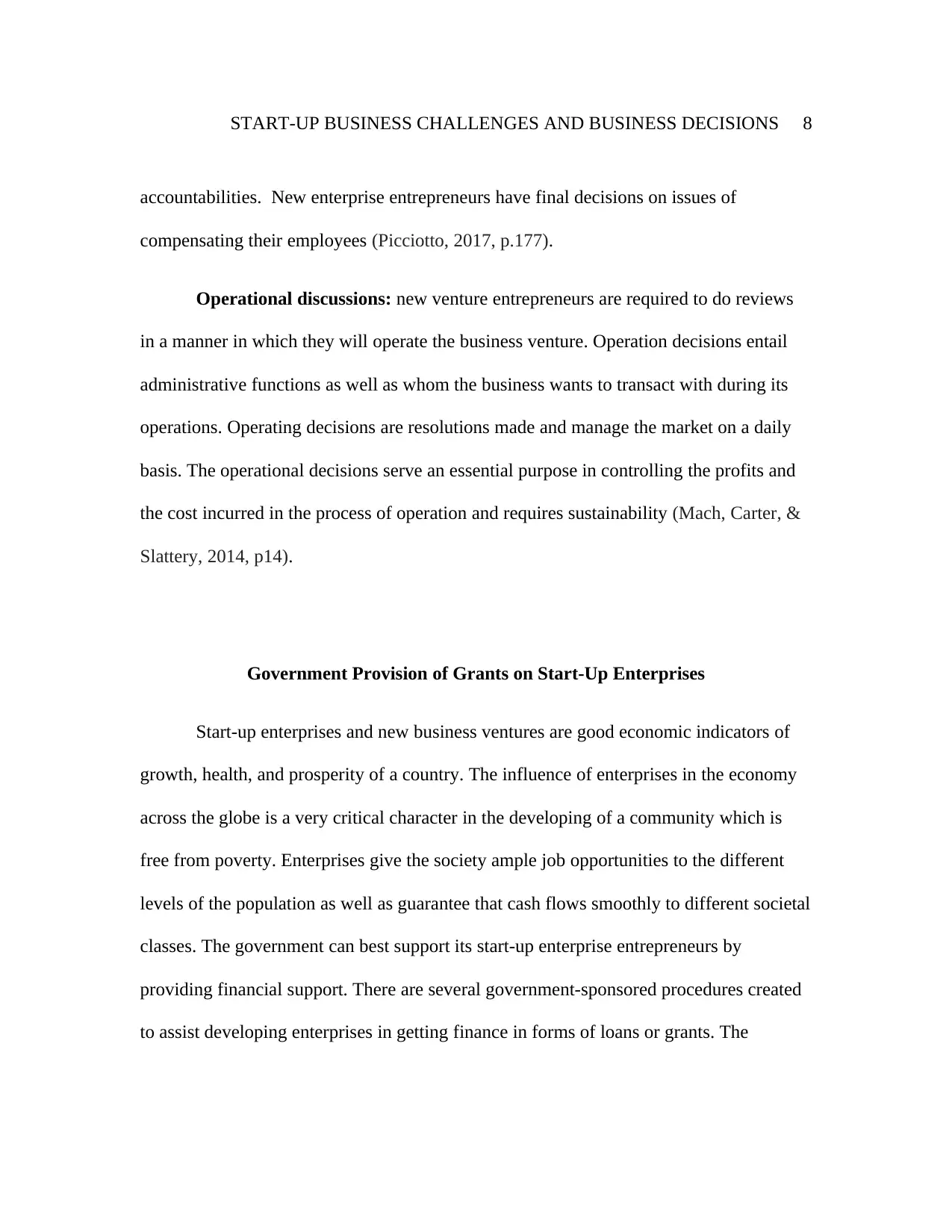
START-UP BUSINESS CHALLENGES AND BUSINESS DECISIONS 8
accountabilities. New enterprise entrepreneurs have final decisions on issues of
compensating their employees (Picciotto, 2017, p.177).
Operational discussions: new venture entrepreneurs are required to do reviews
in a manner in which they will operate the business venture. Operation decisions entail
administrative functions as well as whom the business wants to transact with during its
operations. Operating decisions are resolutions made and manage the market on a daily
basis. The operational decisions serve an essential purpose in controlling the profits and
the cost incurred in the process of operation and requires sustainability (Mach, Carter, &
Slattery, 2014, p14).
Government Provision of Grants on Start-Up Enterprises
Start-up enterprises and new business ventures are good economic indicators of
growth, health, and prosperity of a country. The influence of enterprises in the economy
across the globe is a very critical character in the developing of a community which is
free from poverty. Enterprises give the society ample job opportunities to the different
levels of the population as well as guarantee that cash flows smoothly to different societal
classes. The government can best support its start-up enterprise entrepreneurs by
providing financial support. There are several government-sponsored procedures created
to assist developing enterprises in getting finance in forms of loans or grants. The
accountabilities. New enterprise entrepreneurs have final decisions on issues of
compensating their employees (Picciotto, 2017, p.177).
Operational discussions: new venture entrepreneurs are required to do reviews
in a manner in which they will operate the business venture. Operation decisions entail
administrative functions as well as whom the business wants to transact with during its
operations. Operating decisions are resolutions made and manage the market on a daily
basis. The operational decisions serve an essential purpose in controlling the profits and
the cost incurred in the process of operation and requires sustainability (Mach, Carter, &
Slattery, 2014, p14).
Government Provision of Grants on Start-Up Enterprises
Start-up enterprises and new business ventures are good economic indicators of
growth, health, and prosperity of a country. The influence of enterprises in the economy
across the globe is a very critical character in the developing of a community which is
free from poverty. Enterprises give the society ample job opportunities to the different
levels of the population as well as guarantee that cash flows smoothly to different societal
classes. The government can best support its start-up enterprise entrepreneurs by
providing financial support. There are several government-sponsored procedures created
to assist developing enterprises in getting finance in forms of loans or grants. The
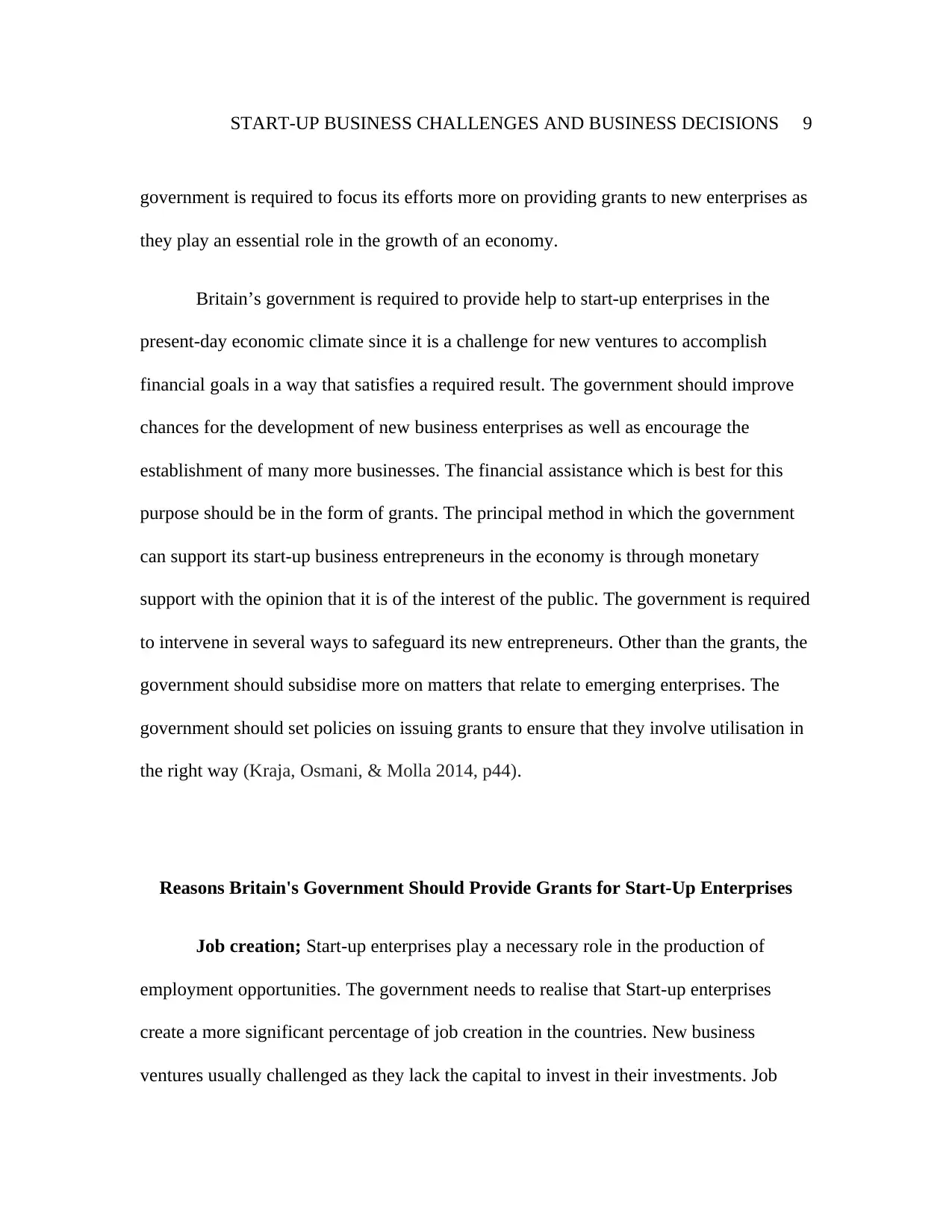
START-UP BUSINESS CHALLENGES AND BUSINESS DECISIONS 9
government is required to focus its efforts more on providing grants to new enterprises as
they play an essential role in the growth of an economy.
Britain’s government is required to provide help to start-up enterprises in the
present-day economic climate since it is a challenge for new ventures to accomplish
financial goals in a way that satisfies a required result. The government should improve
chances for the development of new business enterprises as well as encourage the
establishment of many more businesses. The financial assistance which is best for this
purpose should be in the form of grants. The principal method in which the government
can support its start-up business entrepreneurs in the economy is through monetary
support with the opinion that it is of the interest of the public. The government is required
to intervene in several ways to safeguard its new entrepreneurs. Other than the grants, the
government should subsidise more on matters that relate to emerging enterprises. The
government should set policies on issuing grants to ensure that they involve utilisation in
the right way (Kraja, Osmani, & Molla 2014, p44).
Reasons Britain's Government Should Provide Grants for Start-Up Enterprises
Job creation; Start-up enterprises play a necessary role in the production of
employment opportunities. The government needs to realise that Start-up enterprises
create a more significant percentage of job creation in the countries. New business
ventures usually challenged as they lack the capital to invest in their investments. Job
government is required to focus its efforts more on providing grants to new enterprises as
they play an essential role in the growth of an economy.
Britain’s government is required to provide help to start-up enterprises in the
present-day economic climate since it is a challenge for new ventures to accomplish
financial goals in a way that satisfies a required result. The government should improve
chances for the development of new business enterprises as well as encourage the
establishment of many more businesses. The financial assistance which is best for this
purpose should be in the form of grants. The principal method in which the government
can support its start-up business entrepreneurs in the economy is through monetary
support with the opinion that it is of the interest of the public. The government is required
to intervene in several ways to safeguard its new entrepreneurs. Other than the grants, the
government should subsidise more on matters that relate to emerging enterprises. The
government should set policies on issuing grants to ensure that they involve utilisation in
the right way (Kraja, Osmani, & Molla 2014, p44).
Reasons Britain's Government Should Provide Grants for Start-Up Enterprises
Job creation; Start-up enterprises play a necessary role in the production of
employment opportunities. The government needs to realise that Start-up enterprises
create a more significant percentage of job creation in the countries. New business
ventures usually challenged as they lack the capital to invest in their investments. Job
⊘ This is a preview!⊘
Do you want full access?
Subscribe today to unlock all pages.

Trusted by 1+ million students worldwide
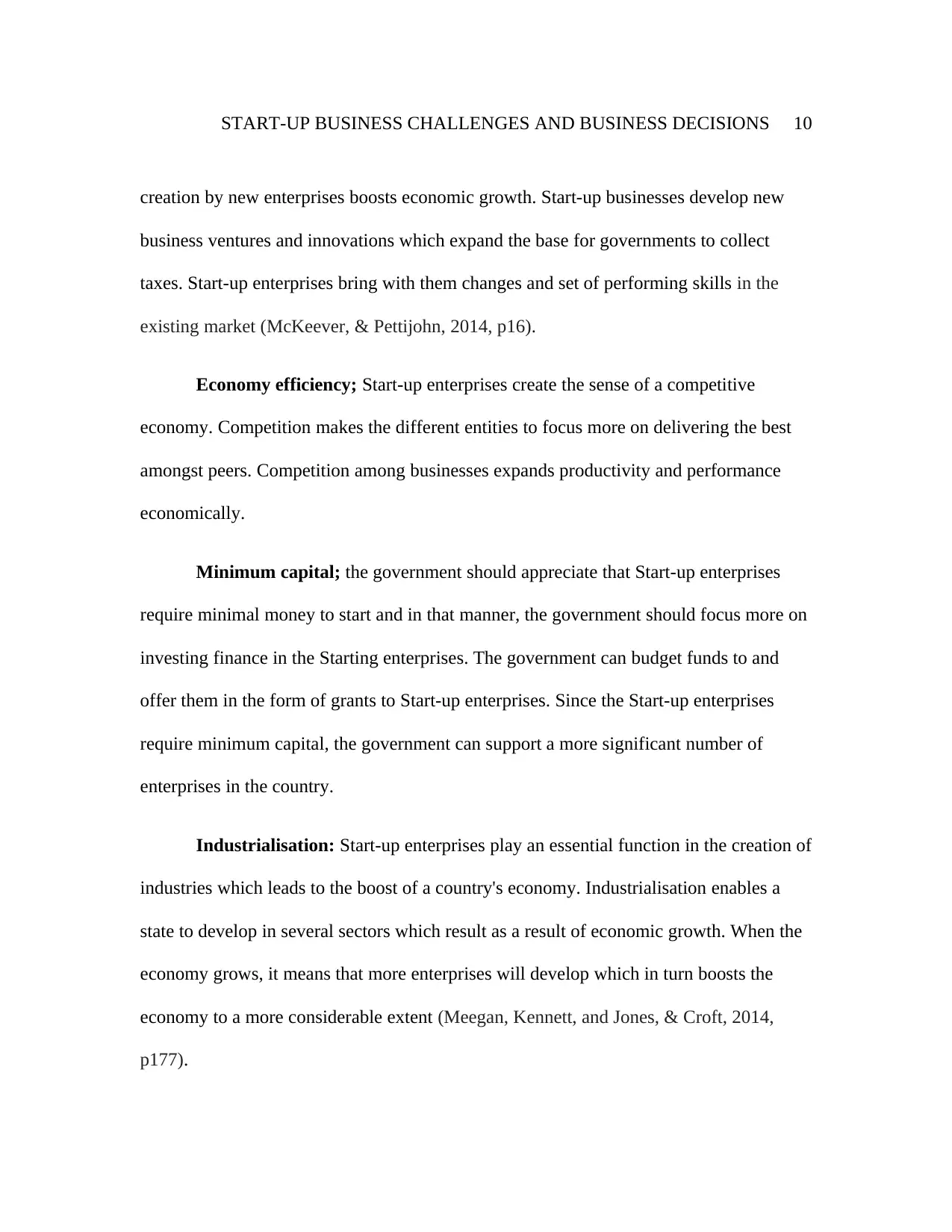
START-UP BUSINESS CHALLENGES AND BUSINESS DECISIONS 10
creation by new enterprises boosts economic growth. Start-up businesses develop new
business ventures and innovations which expand the base for governments to collect
taxes. Start-up enterprises bring with them changes and set of performing skills in the
existing market (McKeever, & Pettijohn, 2014, p16).
Economy efficiency; Start-up enterprises create the sense of a competitive
economy. Competition makes the different entities to focus more on delivering the best
amongst peers. Competition among businesses expands productivity and performance
economically.
Minimum capital; the government should appreciate that Start-up enterprises
require minimal money to start and in that manner, the government should focus more on
investing finance in the Starting enterprises. The government can budget funds to and
offer them in the form of grants to Start-up enterprises. Since the Start-up enterprises
require minimum capital, the government can support a more significant number of
enterprises in the country.
Industrialisation: Start-up enterprises play an essential function in the creation of
industries which leads to the boost of a country's economy. Industrialisation enables a
state to develop in several sectors which result as a result of economic growth. When the
economy grows, it means that more enterprises will develop which in turn boosts the
economy to a more considerable extent (Meegan, Kennett, and Jones, & Croft, 2014,
p177).
creation by new enterprises boosts economic growth. Start-up businesses develop new
business ventures and innovations which expand the base for governments to collect
taxes. Start-up enterprises bring with them changes and set of performing skills in the
existing market (McKeever, & Pettijohn, 2014, p16).
Economy efficiency; Start-up enterprises create the sense of a competitive
economy. Competition makes the different entities to focus more on delivering the best
amongst peers. Competition among businesses expands productivity and performance
economically.
Minimum capital; the government should appreciate that Start-up enterprises
require minimal money to start and in that manner, the government should focus more on
investing finance in the Starting enterprises. The government can budget funds to and
offer them in the form of grants to Start-up enterprises. Since the Start-up enterprises
require minimum capital, the government can support a more significant number of
enterprises in the country.
Industrialisation: Start-up enterprises play an essential function in the creation of
industries which leads to the boost of a country's economy. Industrialisation enables a
state to develop in several sectors which result as a result of economic growth. When the
economy grows, it means that more enterprises will develop which in turn boosts the
economy to a more considerable extent (Meegan, Kennett, and Jones, & Croft, 2014,
p177).
Paraphrase This Document
Need a fresh take? Get an instant paraphrase of this document with our AI Paraphraser

START-UP BUSINESS CHALLENGES AND BUSINESS DECISIONS 11
Conclusion
Start-up enterprises, as well as existing enterprises, play an essential role in
Britain’s economy. The government can provide grants to Start-up enterprises in the
state. Government grants funds businesses as well as innovative ideas. Loans and grants
help stimulate the economy by helping their establishments. The grants require that
policies are set to guarantee correct utilisation of funds. Grants for Start-up enterprises
will ensure that new ventures will establish and those in existences thrive.
Conclusion
Start-up enterprises, as well as existing enterprises, play an essential role in
Britain’s economy. The government can provide grants to Start-up enterprises in the
state. Government grants funds businesses as well as innovative ideas. Loans and grants
help stimulate the economy by helping their establishments. The grants require that
policies are set to guarantee correct utilisation of funds. Grants for Start-up enterprises
will ensure that new ventures will establish and those in existences thrive.
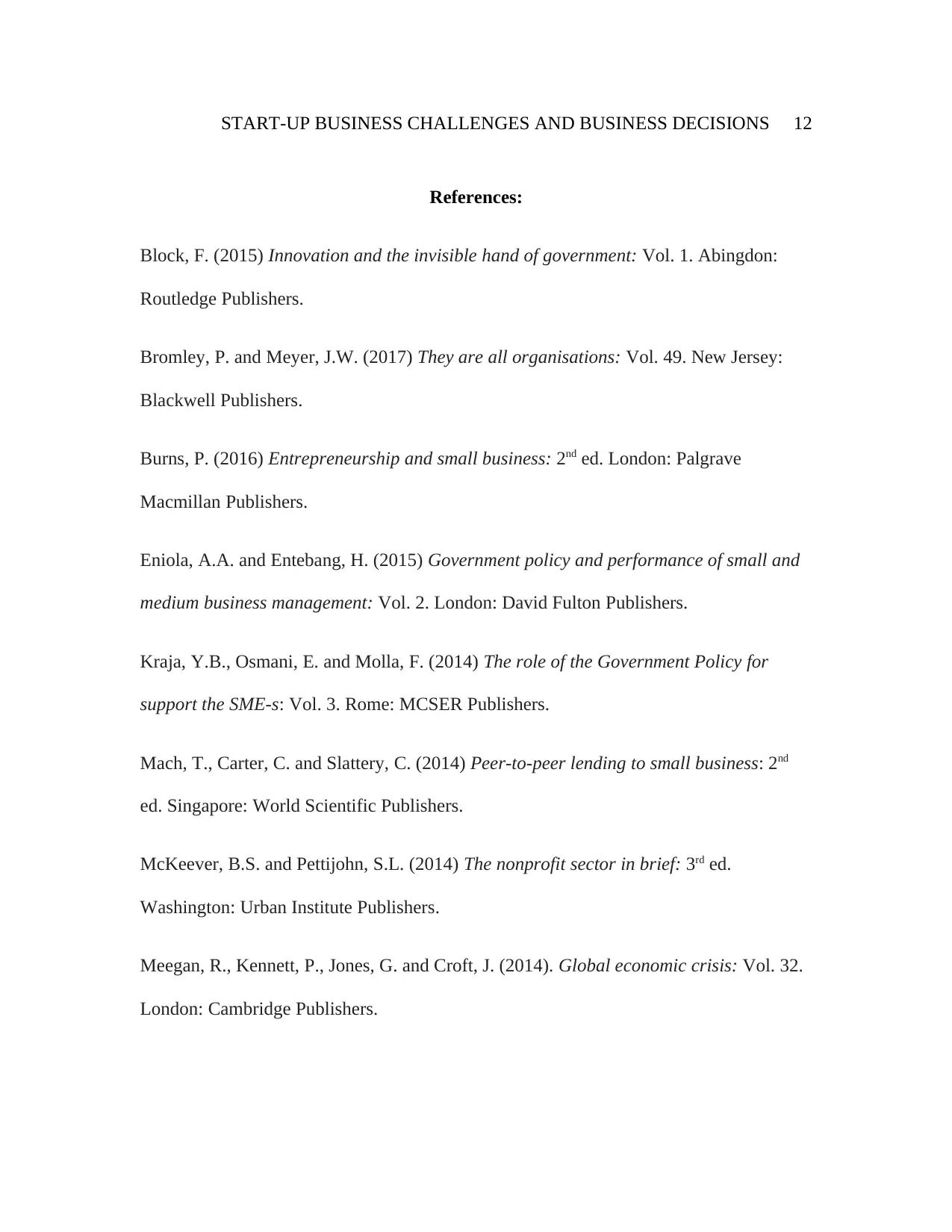
START-UP BUSINESS CHALLENGES AND BUSINESS DECISIONS 12
References:
Block, F. (2015) Innovation and the invisible hand of government: Vol. 1. Abingdon:
Routledge Publishers.
Bromley, P. and Meyer, J.W. (2017) They are all organisations: Vol. 49. New Jersey:
Blackwell Publishers.
Burns, P. (2016) Entrepreneurship and small business: 2nd ed. London: Palgrave
Macmillan Publishers.
Eniola, A.A. and Entebang, H. (2015) Government policy and performance of small and
medium business management: Vol. 2. London: David Fulton Publishers.
Kraja, Y.B., Osmani, E. and Molla, F. (2014) The role of the Government Policy for
support the SME-s: Vol. 3. Rome: MCSER Publishers.
Mach, T., Carter, C. and Slattery, C. (2014) Peer-to-peer lending to small business: 2nd
ed. Singapore: World Scientific Publishers.
McKeever, B.S. and Pettijohn, S.L. (2014) The nonprofit sector in brief: 3rd ed.
Washington: Urban Institute Publishers.
Meegan, R., Kennett, P., Jones, G. and Croft, J. (2014). Global economic crisis: Vol. 32.
London: Cambridge Publishers.
References:
Block, F. (2015) Innovation and the invisible hand of government: Vol. 1. Abingdon:
Routledge Publishers.
Bromley, P. and Meyer, J.W. (2017) They are all organisations: Vol. 49. New Jersey:
Blackwell Publishers.
Burns, P. (2016) Entrepreneurship and small business: 2nd ed. London: Palgrave
Macmillan Publishers.
Eniola, A.A. and Entebang, H. (2015) Government policy and performance of small and
medium business management: Vol. 2. London: David Fulton Publishers.
Kraja, Y.B., Osmani, E. and Molla, F. (2014) The role of the Government Policy for
support the SME-s: Vol. 3. Rome: MCSER Publishers.
Mach, T., Carter, C. and Slattery, C. (2014) Peer-to-peer lending to small business: 2nd
ed. Singapore: World Scientific Publishers.
McKeever, B.S. and Pettijohn, S.L. (2014) The nonprofit sector in brief: 3rd ed.
Washington: Urban Institute Publishers.
Meegan, R., Kennett, P., Jones, G. and Croft, J. (2014). Global economic crisis: Vol. 32.
London: Cambridge Publishers.
⊘ This is a preview!⊘
Do you want full access?
Subscribe today to unlock all pages.

Trusted by 1+ million students worldwide
1 out of 13
Related Documents
Your All-in-One AI-Powered Toolkit for Academic Success.
+13062052269
info@desklib.com
Available 24*7 on WhatsApp / Email
![[object Object]](/_next/static/media/star-bottom.7253800d.svg)
Unlock your academic potential
Copyright © 2020–2025 A2Z Services. All Rights Reserved. Developed and managed by ZUCOL.




